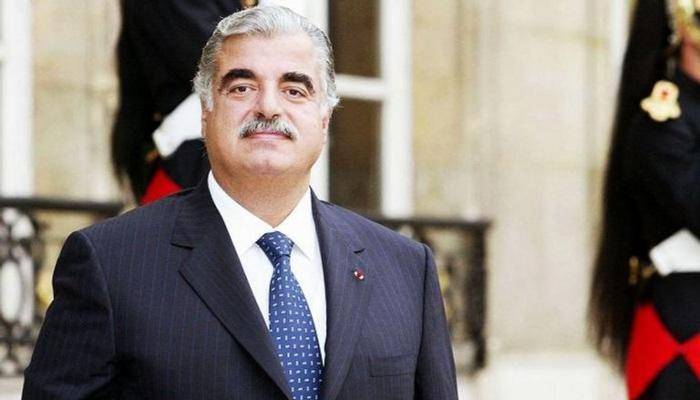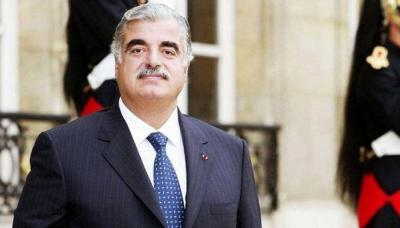Unlike previous years, the Future Movement's celebration of the anniversary of the assassination of former Prime Minister Rafik Hariri was subdued this year, limited to a vigil at the grave in downtown Beirut. The event included former Prime Minister Saad Hariri, some political figures, and a considerable gathering of supporters from "Future."
Three weeks after announcing his suspension of political work and his decision not to participate in the upcoming parliamentary elections, and after leaving Lebanon, Hariri returned to Beirut a day before the anniversary of his father's assassination. He simply stated to the media, "The scene at the grave said everything, and the supporters of 'Future' are free to participate in the parliamentary elections."
As he departed, Hariri greeted the crowds and political and popular delegations of Future supporters who had gathered at the grave amid chants of support for him. He noted that since the morning, the grave site in downtown Beirut had witnessed an influx of popular delegations and political and official figures marking the 17th anniversary of his assassination.
Several personalities visited the grave to recite Al-Fatiha, including Prime Minister Najib Mikati, former Prime Minister Fouad Siniora, and Progressive Socialist Party leader Walid Jumblatt, who remarked, "We are destined to recite Al-Fatiha in Mukhtara and in Beirut at Martyrs' Square every year, and we are destined to endure, and we will endure."
Mikati also tweeted: "The memory of the martyr President Rafik Hariri will remain a bright landmark in the history of this nation, due to the great efforts he exerted in all fields, marking a pivotal point that absence cannot erase or diminish its glow. In this difficult time we are experiencing, we particularly remember his wisdom and determination in facing all challenges and difficulties. May he rest in peace."
Interior Minister Bassam Mawlawi also visited the grave, laid a wreath, and recited Al-Fatiha, considering that "the project of Rafik Hariri, like that of the current government, is about building the state, and there is an insistence on conducting the parliamentary elections." He stressed that "Lebanon has an Arab identity and belonging, that its image will not change, and its Arabism is assured in the constitution, and it will remain Arab."
Furthermore, Lebanon's Grand Mufti Sheikh Abdul Latif Derian visited Hariri's grave in downtown Beirut, heading a significant delegation of scholars. Derian noted that "honoring the martyr involves praying for him and having mercy on him, but it also involves preserving his ethical, developmental, and national legacy, and continuing public work in light of the constructive consensus approach he adopted throughout his political career, even until his last breath." He added, "On the anniversary of his martyrdom, we reaffirm our commitment to his path, upholding a unified Lebanon and defending its safety, security, and dignity."
Several politicians issued statements on the occasion recalling Hariri. Lebanese Forces leader Samir Geagea tweeted: "The memory of February 14 cannot pass without reflecting on its national dimensions, for the assassination of President Rafik Hariri was an attempt to assassinate a Lebanese political project that the martyr President embodied through his extensive relationships that reconnected Lebanon with centers of decision, placing Lebanon on the Arab and international map, moving the country from war to reconstruction, and restoring the lifestyle that people were accustomed to. The moment the axis of resistance realized that what martyr Rafik Hariri achieved would inevitably lead to the establishment of the state and the departure of the Syrian army, this axis proceeded to assassinate him, believing that this assassination would destroy his project." He added, "But the blood of martyr Rafik Hariri united the Lebanese, Christians and Muslims, around his project, leading to a massive uprising on March 14, 2005, calling for the departure of the Syrian army and raising the slogans of Lebanon first, the state first, and sovereignty first... and this will be."




